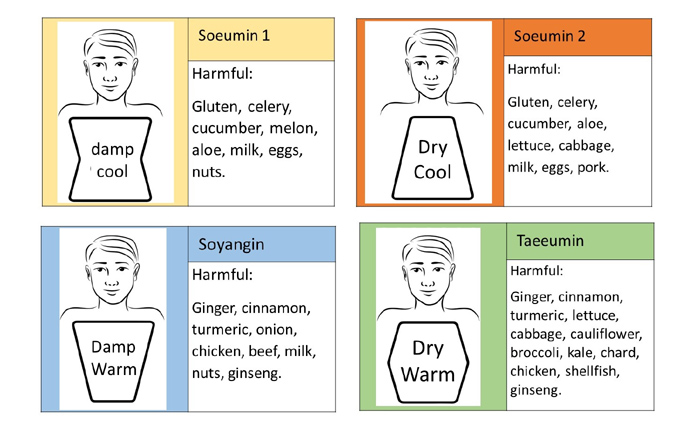Harmful foods help to diagnose the constitution.
By David Lee, L.Ac.
Identifying which foods may cause health problems for a patient is one of the key methods used to determine their four constitutions. Once identified, precise herbal medicine and dietary recommendations can be tailored to the individual according to Korean Sasang Constitutional Medicine. Korean medicine has played a critical role in restoring normal organ function, glandular activity, and immune system health.
It’s important to recognize that foods can act as both nutrition and medicine, with negative reactions sometimes occurring when the body is intolerant to certain ingredients. Such reactions go beyond a simple dislike and may result in the body attempting to expel the offending substance through the production of mucus or other bodily processes.
There are two primary types of reactions to consider: allergies and intolerances. Allergies involve the immune system releasing histamines, leading to symptoms such as itchy red skin, shortness of breath, sneezing, watery eyes, post-nasal dripping, and fatigue.
On the other hand, intolerance often results in negative symptoms related to digestion and sometimes unrelated to the immune system. Such are nausea, diarrhea, constipation, abdominal cramping, bloating, gas, headache, dysmenorrhea, and erectile dysfunction.
It’s important to note that reactions to foods can vary significantly from one individual to another. However, a strong negative reaction to one food often suggests that other ingredients within the same category may also have adverse effects.
Some of the most common food allergens and intolerances include nuts, dairy, shellfish, gluten, and eggs. There are less well-known but still significant allergens and intolerances that affect a smaller group of people. These can include celery, cucumber, pork, ginger, ginseng, turmeric, chicken, cabbage, and beef. It’s essential for individuals to pay attention to their body’s reactions to different foods and to seek medical advice if necessary to identify any potential intolerances or allergies.
For individuals with Soeumin 1 constitution, an excess of Damp and Cold within the body may lead to internal imbalances. To counteract this, it’s recommended to consume Dry and Warm foods, which can help restore balance and improve the body’s ability to identify and correct any issues. Following this dietary advice, the body can function optimally without triggering an allergic or intolerant response.
Likewise, Soeumin 2 has too much Dry and Cold. They need Damp and Warm foods. Soyangin has too much Damp and Hot. They need Dry and Cold foods. Lastly, Taeeumin has too much Dry and Hot. They need Damp and Cold foods.
Body types have different food requirements, and it’s essential to understand them to maintain optimal health. For instance, Damp body types, such as Soeumin 1 and Soyangin, should minimize Dampening foods such as nuts (peanut, walnut, cashew, almond, pistachio, Brazil, macadamia, sunflower seed, flax seed, pumpkin seed), dairy, and beef, as they can cause digestive problems.
Soeumin 2, a Dry and Cold body type, should also minimize dairy because it’s Cold. However, it’s worth noting that some individuals in Soeumin 1 and Soyangin may tolerate nuts and dairy without any issue.
On the other hand, Dry body types, like Taeeumin and some Soeumin 2, can digest Damp foods without any trouble. However, they should minimize Dry foods such as shellfish, lettuce (iceberg, romaine), and cabbage varieties (broccoli, cauliflower, kale, chard) as they can be harmful. These effects may be subtle, but they are real. For example, a Taeeumin with a dry body type who consumed press-juiced lettuce and cabbage daily for one year experienced erectile dysfunction as a result.
In addition to the above, Cold body types Soeumin 1 and Soeumin 2 should minimize Cold foods such as gluten, egg white, cucumber, celery, aloe vera, and pork as they can cause digestive upset. Nightshades such as tomato, bell pepper, and eggplant are also Cold, but they promote health and well-being for Taeeumin and Soyangin.
Warming foods benefit Cold Soeumin 1 and 2 body types, but they can cause intolerant reactions, such as heat, irritability, high appetite, irritable bowel, and frequent urination in Hot body types Taeeumin and Soyangin.
It’s worth noting that Soeumin 2 has hypersensitivity to various foods and additives, such as taste enhancers (Monosodium Glutamate, sweetener), GMOs, coloring, and preservatives (sulfites). These substances can cause them to feel sick and disturb their digestive system.
It’s important to remember that negative reactions increase the possibility of the body type. While one piece of information may be accurate up to 90%, there are exceptions and variations, making it necessary for practitioners to gather much information related to the constitution before making a diagnosis.

































